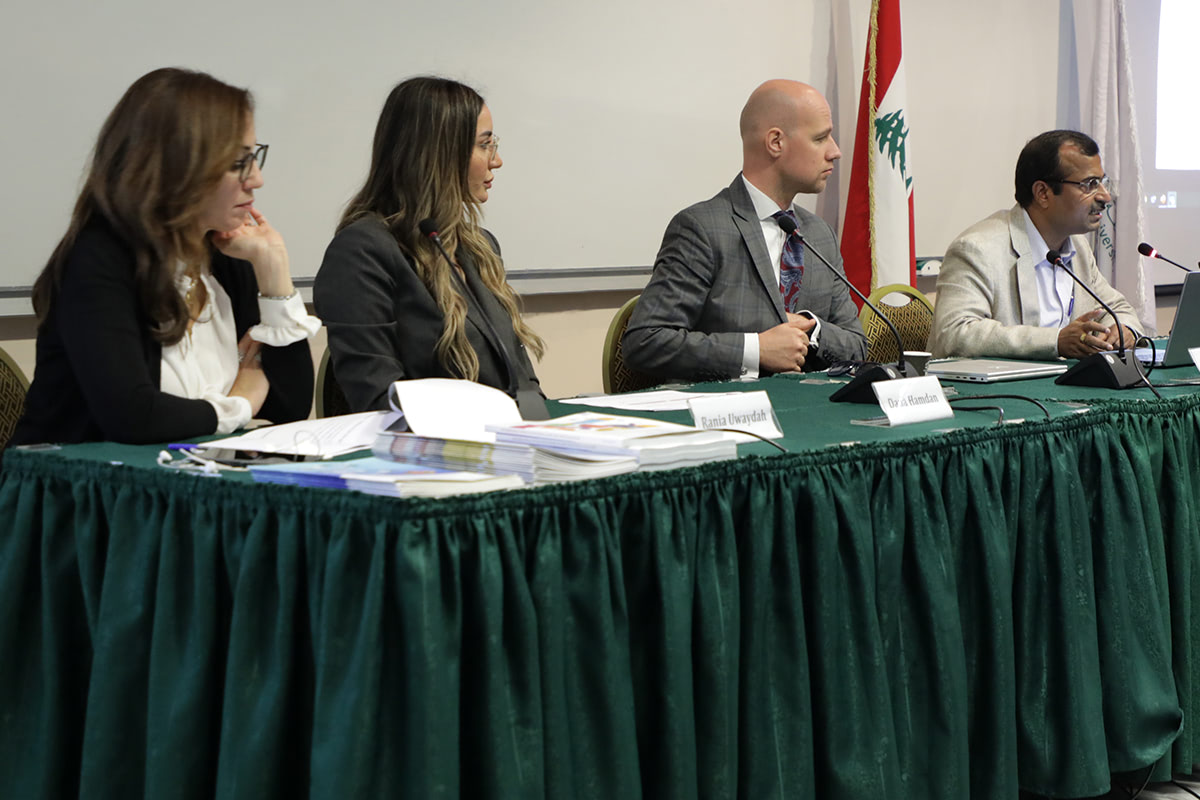Assessing the Progress of Arab States Toward the Sustainable Development Goals: The Role of Social Expenditures
A seminar held by AKSOB’s Department of Economics brings to light the report on Social Expenditure Monitor for Arab States, jointly produced by ESCWA, the UNDP and UNICEF.
While countries worldwide strive to meet the United Nations Sustainable Development Goals (SDGs) that call for building economic growth, addressing social needs equitably and preserving our planet, the Arab States lag behind. To redress the situation, they would need to effectively rebalance their priorities, focus on social expenditure, and improve their public financial management.
How to go about these reforms was the topic of a seminar organized by the Department of Economics at the Adnan Kassar School of Business (AKSOB) on March 29 – as part of its Economics and Public Policy Seminar Series – which discussed the Social Expenditure Monitor for Arab States report released by The Economic and Social Commission for Western Asia (ESCWA).
The Department of Economics invited ESCWA’s Senior Economic Affairs Officer, report lead author and coordinator Niranjan Sarangi, Research Assistant Dana Hamdan, and Economic Affairs Officer Jan Gaska to present the report and discuss its main findings and recommendations. They were joined by Advisor to the United Nations Development Programme (UNDP) Regional Bureau for Arab States Rania Uwaydah.
At the seminar, experts discussed the latest developments and trends in social policy spending in the Arab region, as well as the obstacles and prospects for achieving the SDGs.
“Despite significant progress made by some Arab countries in social development and spending, persistent poverty, inequality, and social exclusion remain a challenge for others in the region,” noted Associate Professor and the department’s Chairperson Ali Fakih. “Against this backdrop, social policy spending has become a critical tool for enhancing social protection, promoting human capital, enhancing productivity and growth, upholding human rights, and reducing poverty and inequality.”
“The Social Expenditure Monitor report stands as a pioneering assessment of social spending in the Arab region which is intended to galvanize progress across the SDGs,” noted Dr. Sarangi. “Social spending is a pillar of the wellbeing of individuals and society, an engine of progress in the fields of education and health, and a way to protect vulnerable groups. The report’s recommendations support Arab countries in devising strong budgets and in making expenditure choices more equitable, efficient and effective to ensure that no one is left behind,” he highlighted.
Data on social expenditure by country is provided as a guideline for needed reforms. It can be used by each Arab State and its decision-makers to develop reliable budgets and formulate more equitable, efficient and sustainable fiscal policies. The study on Lebanon is among those that have already been completed, based on publicly available budgets.
An analysis of the equity, efficiency, and effectiveness of fiscal policy and budgeting in the Arab region revealed that the average public social expenditure of Arab States on health, education, and social protection, as a share of GDP, is lower than the world average. This is concerning for achieving the SDGs and ensuring inclusive and sustainable growth.
The Social Expenditure Monitor report proposes a new approach for monitoring social expenditures across seven dimensions aligned with the SDGs: Education; health and nutrition; housing, connectivity and community amenities; labor market interventions and employment generation; social protection, subsidies and support to farms; arts, culture and sports; and environmental protection.
Through detailed data and analysis, the report aims to optimize links between expenditure choices and macroeconomic objectives, provide a basis for better statistics, and strengthen advocacy for much-needed fiscal policy reforms to meet various objectives crucial for macroeconomic and social stability.
Arab countries would have to build their budgets by rebalancing priorities toward improved public financial management. An 11-point agenda in the report reinforces these findings and offers suggestions for increasing social spending while ensuring economic sustainability.
In increasing social spending and fiscal sustainability, a certain number of policy consequences or implications must be considered, prominent among them being public financial management (PFM).
A solid PFM system, explained Uwaydah, guarantees that governmental policies are properly executed and that associated development objectives are accomplished. Ensuring that the funds received actually reach their destination and policy decisions are implemented to achieve the relevant development goals is critical, especially at a time of considerable resource constraints.
The Social Expenditure Monitor for Arab States seminar provided a comprehensive evaluation of the social policy expenditures in the Arab region to enhance their performance toward the SDGs. The recommendations in the report are intended to help Arab nations develop reliable budgets and make more equitable, efficient, and effective expenditure decisions to ensure inclusivity and sustainable development. They further highlight the need to invest in human capital in order to support future development.
The discussion was an opportunity for students to learn about experts’ perspectives and the issues related to the impact of social spending in the Arab World. A cooperative discussion following the main presentations, said Dr. Fakih, “certainly played an important role in improving their networking and communication skills as well as renewing their confidence and motivation to enhance their knowledge in the specific areas addressed.”
Reporting by Economics Student Dana Ghoussaini.
